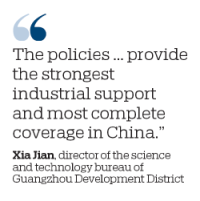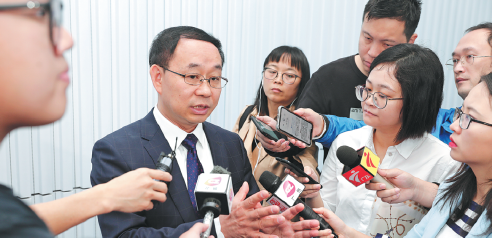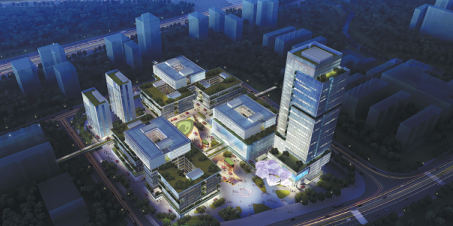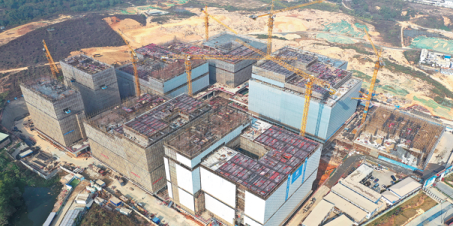Guangzhou Development District, located in South China's Guangdong province, is focusing its attention on developing nanotechnology in order to become a world leader in the technology with independent intellectual property rights.
"At present, China's basic research on nanotechnology is at the forefront of the world, with up to 210,000 nanotechnology patents, however, China's transformation rate of the technological results is still very low," said Zhao Yuliang, director at the National Center for Nanoscience and Technology and an academician of the Chinese Academy of Sciences. "Translating these basic research findings into the productivity of our country is a challenge before us."
Relying on the advantages that the Guangdong-Hong Kong-Macao Greater Bay Area has in talented professionals and advanced industrial capability, Guangzhou Development District is aiming to transform research results in nanotechnology into applicable and marketable technologies and products, Zhao added.
To foster the development of nanotechnology, the district introduced a series of new incentive policies on Tuesday, in Guangzhou.
"The policies are targeted for the nanotechnology industry and provide the strongest industrial support and most complete coverage in China. They are also the only local industrial policies led by academic research," said Xia Jian, director of the science and technology bureau of Guangzhou Development District.
The policies will help the district build an all-around nanotechnology ecosystem and realize high-quality development, Xia added.
Offering multiple supportive incentives and rewards, the policies can grant enterprises up to 170 million yuan ($24.27 million) each.
The policies support the construction of public nanotechnology service platforms, and offer rewards to entities establishing each platform, with a maximum award reaching 50 million yuan.
The public technology service platforms include those focused on nano processing technology, nanotechnology pilot plant testing and application promotion, nanotechnology testing and analysis, nano biological effects and safety research.
According to the policies, if a newly established nanotechnology enterprise with a registered capital of more than 10 million yuan rents property for offices, Guangzhou Development District will offer the enterprise a subsidy equal to 50 percent of the rent for three years, with an annual maximum subsidy of 1 million yuan.
As for companies with a registered capital of more than 10 million yuan that purchase property for offices, the district will provide a one-time subsidy amounting to 10 percent of the purchase price, with a maximum subsidy of 5 million yuan.
The policies also allocate subsidies for high-level nanotechnology industry summits, forums and academic exchange activities.
After the approval of the departments of science and technology of Guangzhou Development District, event organizers can receive a subsidy equal to 30 percent of the event's costs. The maximum subsidy for each event is 1 million yuan.
The incentive policies also support small, medium- and micro-sized nanotechnology enterprises.
The district will select a maximum of 10 small, medium-and micro-sized companies among those with revenues of more than 10 million yuan in the previous year, and offer equity investment. The maximum equity investment for each enterprise is 5 million yuan.
To forge a world-renowned center of high-end nanotechnology industry and a hundred-billion yuan industrial cluster, Guangzhou Development District is committed to promoting the construction of a national institute of nanotechnology innovation and a nanotechnology innovation industrial cluster, or the China Nano Valley, according to local officials.
"To name it (the nanotechnology industrial cluster) as 'China Nano Valley' is to hope to gather and serve nanotechnology research institutions and enterprises nationwide," Zhao said. "In the future, the China Nano Valley will be capable of transforming not only the nanotechnology achievements made in the Guangdong-Hong Kong-Macao Greater Bay Area, but also the ones in any other regions of China."
With a planned construction area of 1.1 square kilometers, the China Nano Valley will have four industrial parks with different focuses of intelligent technology, life and health technology, energy and environment and composite materials.
Nanotechnology can not only help improve the quality of development and efficiency of existing pillar industries, but also help empower emerging industries and cultivate future industries, proving to be strong technical support for Guangzhou Development District to establish a modern industrial system with international competitiveness, said local officials.
At the event on Tuesday, where the incentive policies for the nanotechnology industry were released, 19 nanotechnology cooperation projects were also inked, out of which 15 were signed between the district's national institute of nanotechnology innovation and enterprises from sectors including new material, new energy, intelligent technology, medical treatment and finance.
The national institute of nanotechnology innovation will provide enterprises with research and development platforms and technical resources, which is expected to bring new development opportunities to these enterprises, said a senior official at the event.
By ZHANG DANDAN | China Daily | 2019-12-20


Zhao Yuliang, director of the National Center for Nanoscience and Technology, and an academician of the Chinese Academy of Sciences, answers questions about nanotechnology at a recent conference in Guangzhou. CHINA DAILY

A visual rendering of the China Nano Valley. CHINA DAILY

The valley is under construction at the Guangzhou Development District. CHINA DAILY




